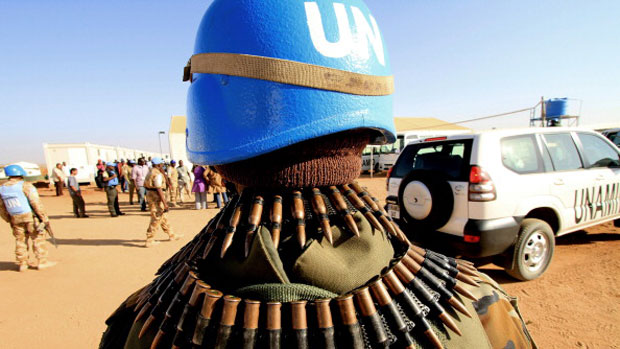Predatory peacekeepers: The UN sex abuse scandal
Whistleblower who exposed abuse of children resigns from post, citing the 'impunity' of those responsible

A free daily email with the biggest news stories of the day – and the best features from TheWeek.com
You are now subscribed
Your newsletter sign-up was successful
A United Nations whistleblower who leaked a confidential report alleging the sexual abuse of children by French peacekeepers in the Central African Republic has resigned.
Anders Kompass, director of field operations at the UN human rights office in Geneva, cited the organisation's failure to hold senior officials accountable for the accusations as the reason for his departure.
After leaking the internal documents in 2014, Kompass was suspended from the organisation, but a UN tribunal later ruled that the suspension had been unlawful and he was cleared of all charges.
The Week
Escape your echo chamber. Get the facts behind the news, plus analysis from multiple perspectives.

Sign up for The Week's Free Newsletters
From our morning news briefing to a weekly Good News Newsletter, get the best of The Week delivered directly to your inbox.
From our morning news briefing to a weekly Good News Newsletter, get the best of The Week delivered directly to your inbox.
The Swedish aid worker, who has been employed by the UN for more than three decades, told the IRIN news agency that it has become "impossible for me to continue working here".
"The complete impunity for those who have been found to have, in various degrees, abused their authority, together with the unwillingness of the hierarchy to express any regrets for the way they acted towards me sadly confirms that lack of accountability is entrenched in the UN," he said.
What happened?
The report alleges that French soldiers stationed in the Central African Republic raped and sodomised starving young children, often in exchange for food. The crimes were reported between December 2013 and June 2014 at a camp for internally displaced people in the capital Bangui.
A free daily email with the biggest news stories of the day – and the best features from TheWeek.com
"This would be abhorrent whatever the circumstances," Cathy Newman writes in the Daily Telegraph. "But when it's the very soldiers tasked with keeping the peace and helping war-torn countries put themselves back together, it takes the allegations to a whole new level."
One of the most disturbing cases involved three young girls who allege that they were tied up by a French military commander and forced to have sex with a dog.
Interviews with the children were carried out by UN staff members, but no action was taken and the information was not passed to the French until Kompass decided to act, The Guardian reports.
Is this the only case?
No, allegations of sexual abuse and exploitation have haunted the UN for decades, with peacekeeping missions in Kosovo, Liberia and Haiti marred by similar stories. Secretary General Ban Ki-moon has admitted the scale of the problem, describing it as "a cancer" in the system.
"The UN has conducted internal investigations and revamped training programs. But the complaints continue to roll in," the Washington Post reports.
What is being done to stop this?
Earlier this year, the UN Security Council passed its first resolution to tackle sexual abuse by peacekeepers and provide medical and psychological support for their victims. Human Rights Watch described it as a step in the right direction but said there was "much left to be done".
Campaigners are now calling for an independent body of prosecutors and judges to be established. "That seems the least Ban Ki-moon can do to restore credibility to his beleaguered organisation," says Newman.
-
 Film reviews: ‘Send Help’ and ‘Private Life’
Film reviews: ‘Send Help’ and ‘Private Life’Feature An office doormat is stranded alone with her awful boss and a frazzled therapist turns amateur murder investigator
-
 Movies to watch in February
Movies to watch in Februarythe week recommends Time travelers, multiverse hoppers and an Iraqi parable highlight this month’s offerings during the depths of winter
-
 ICE’s facial scanning is the tip of the surveillance iceberg
ICE’s facial scanning is the tip of the surveillance icebergIN THE SPOTLIGHT Federal troops are increasingly turning to high-tech tracking tools that push the boundaries of personal privacy
-
 Israel retrieves final hostage’s body from Gaza
Israel retrieves final hostage’s body from GazaSpeed Read The 24-year-old police officer was killed during the initial Hamas attack
-
 China’s Xi targets top general in growing purge
China’s Xi targets top general in growing purgeSpeed Read Zhang Youxia is being investigated over ‘grave violations’ of the law
-
 Panama and Canada are negotiating over a crucial copper mine
Panama and Canada are negotiating over a crucial copper mineIn the Spotlight Panama is set to make a final decision on the mine this summer
-
 Why Greenland’s natural resources are nearly impossible to mine
Why Greenland’s natural resources are nearly impossible to mineThe Explainer The country’s natural landscape makes the task extremely difficult
-
 Iran cuts internet as protests escalate
Iran cuts internet as protests escalateSpeed Reada Government buildings across the country have been set on fire
-
 US nabs ‘shadow’ tanker claimed by Russia
US nabs ‘shadow’ tanker claimed by RussiaSpeed Read The ship was one of two vessels seized by the US military
-
 How Bulgaria’s government fell amid mass protests
How Bulgaria’s government fell amid mass protestsThe Explainer The country’s prime minister resigned as part of the fallout
-
 Femicide: Italy’s newest crime
Femicide: Italy’s newest crimeThe Explainer Landmark law to criminalise murder of a woman as an ‘act of hatred’ or ‘subjugation’ but critics say Italy is still deeply patriarchal